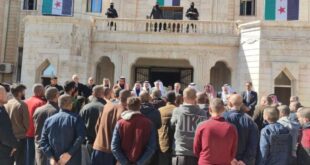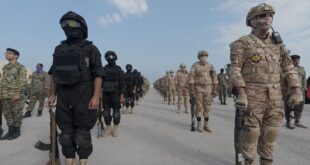A year after his Fateh movement was trounced at the polls, Palestinian President Mahmoud Abbas said Wednesday he will call new legislative elections, a move designed to freeze the Islamist Hamas from power.Abbas’ aides said they expected the election by the end of the year or early 2008. His announcement came as the United States and other international mediators were moving swiftly to try to revive Mideast peace efforts.
In a speech to the Palestine Central Council, Abbas denounced Hamas in the harshest terms, blaming the Islamist group for staging “a coup” against him in Gaza and for provoking Israel and Egypt to seal Gaza’s borders.
Hamas is “committing capital crimes, bloody crimes against our people every day, every minute, every hour,” he fumed. “There will be no dialogue until they return Gaza to what it was before.”
“Even the devil cannot match their lies,” he said.
In five days of bloody fighting in mid-June, Hamas crushed Fateh fighters and the presidential security force in Gaza.
Abbas retaliated by dismissing the Hamas-led coalition government formed after the 2006 elections, and created a caretaker government of technocrats and moderates that governs the West Bank but holds little sway in Gaza.
“We will call on the council to decide on early elections,” he said. “We won’t exclude anybody from having their say in a democratic way.” The council is a policy-making body of the Palestine Liberation Organisation, the umbrella body for worldwide Palestinian groups. Hamas is not a member and rejects its authority.
In Gaza, Hamas spokesman Sami Abu Zuhri said neither Abbas nor the council was empowered to call elections. “It is not legitimate to issue such a recommendation,” he said. “This council has expired and has no mandate and no authority.”
In occupied Jerusalem, the European Union’s foreign policy chief, Javier Solana, said the elections did not come up in his talks with Abbas. “Whatever they decide is something with which we would not interfere, but I don’t think that it’s something for tomorrow,” he said.
Solana was on a last trip to the region before a meeting Thursday in Portugal by the EU, the UN, the US and Russia — the “Quartet” of Mideast peacemakers — with their newly appointed emissary, former British Prime Minister Tony Blair. The meeting was to follow up on President George W. Bush’s call this week for a peace conference in the autumn.
Abbas said the conference, to be chaired by Secretary of State Condoleezza Rice, should address the core issues of Israel’s borders, Palestinian refugees and the status of Jerusalem.
“We have to be ready to establish a Palestinian state when it comes,” he said.
Israel has welcomed the movement to revive peace efforts that stalled in 2000, but has been reluctant to deal with the conflict’s toughest issues as long as violence continues and Hamas — which rejects Israel’s legitimacy as a nation — remains a political factor.
Palestinian officials said Abbas wanted to hold elections before Israel releases dozens of Hamas legislators it has arrested, pre-empting the possibility that they could return to parliament and vote the caretaker government from power.
Israel is unlikely to release the legislators except as part of a prisoner exchange for three captured Israeli soldiers, one held in Gaza and two held by Hizbollah in Lebanon.
To further enhance Fateh’s election chances, Abbas announced he would change the electoral system, eliminating regional balloting. In 2006, Fateh candidates fought each other in several constituencies, allowing Hamas to win those seats and contributing to Fateh’s unprecedented rout.
Instead, Palestinians will vote for parties, and parliament seats would be apportioned according to the percentage of votes each party received.
Though Abbas said the elections will be open to all Palestinians, Hamas said it would oppose the balloting, and it was hard to see how they could be conducted in Gaza.
“The previous election passed quietly, peacefully, smoothly without a drop of blood. I don’t expect the coming election to be quiet without confrontation,” Said Siyam, a prominent Hamas lawmaker in Gaza, told the group’s Al Aqsa television station.
Meanwhile, Gaza’s isolation since the June fighting was beginning to bite, with businessmen and UN officials warning the area’s economy was on the verge of collapse.
More than 68,000 workers have lost their jobs since Gaza’s borders were closed following the factional battles, severing the flow of all but the barest humanitarian supplies into the area — a situation the Quartet should take into account, said John Ging, director of the United Nations Relief and Works Agency in Gaza.
“They must take political decisions to open all the crossings, and then the operational solutions will be found,” he said.
 Eurasia Press & News
Eurasia Press & News



